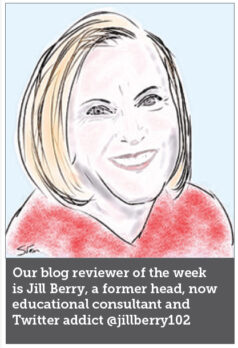Guest reviewer Jill Berry takes us through this week’s best education blogs.
8 conflicting habits of wildly successful people
@LollyDaskal
If you think of the educators that you consider to be particularly effective, are you aware that there can be contradictions and tensions in the way they behave? Lolly Daskal explores eight conflicting habits that could characterise those we believe to be successful. It may help us to reflect on the way we enact our roles and relate to the students and to the staff that we lead. Daskal concludes: “As you work to develop your own style of leadership and success, learn to embrace your own contradictions and let them add depth and texture to everything you do.”
If you don’t have time to read our new book on teacher workload, here’s a summary
@ATLNansi
Managing Teacher Workload, edited by Nansi Ellis, is a timely and potentially very useful book. While recognising that those who work in schools cannot and should not take full responsibility for mounting workload and finding strategies to address the issues, it accepts that there are steps teachers can take to guard against unsustainable overload and burn-out. Ellis summarises the contributions: “A lot of this book is actually about refocusing the time we have on the things that matter, rather than getting bogged down in busy-work. What can you stop doing, to focus on what’s more important?” My advice would be that, however overwhelmed and pressured you may feel, making time to read this book could save you time in the long-run.
We need to take a leaf out of the Bad Moms’ book
@fod3
On the subjects of potential overload and the importance of resisting the tendency towards perfectionism, Freya Odell reflects on watching the film Bad Moms and how it encouraged her to re-examine how teachers use their time and how leaders at all levels can support them to get the balance right. Odell recognises how fear of vulnerability and the pressure of accountability can lead to unsustainable perfectionism, but says: “The destruction of ‘perfectionism’ lies with leaders, and establishing a culture in which the threat of PRP, job losses and budget constraints does not prevent staff honesty and development.”
How to undermine your impact in one simple move
@susanjritchie
I’m not sure I agree with all that Susan Ritchie says in this post, but it certainly stimulated my thinking. She argues that the current focus on authenticity in leadership can encourage leaders to over-share and to be less discriminating than they need to be in what they say to those whose professional practice they are responsible for overseeing, supporting and challenging. “There are some things it’s appropriate to share at work (and this goes for us all) and some things that are best left for…well, best left”. Deciding what not to do and say as a leader, can be as important as deciding what you should do and say.
What I have learnt during my leadership journey
@rondelle10_b
Lastly this week, I enjoyed reading Bukky Yusuf’s reflection on her experience of senior leadership and what she learnt from her mistakes and her achievements. She summarises seven lessons that may help us as we chart our own journeys and concludes: “Hindsight is always a wonderful thing. It allowed me to ascertain what I could have done differently to have had greater impact in my leadership role. However, for educators considering leadership or just about to embark in this role, I hope that the points above aid your transition during your next career steps and help move your organisations forward.”













Your thoughts